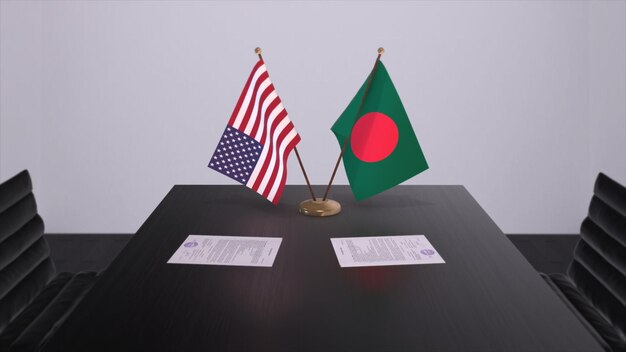Diplomatic Correspondent
Published:2025-07-25 02:34:39 BdST
US, BD to hold final tariff talks on July 29
The United States Trade Representative (USTR), the chief trade negotiation body for the American government, has invited Bangladesh to resume the third and final round of tariff negotiations on July 29.
Commerce Secretary Mahbubur Rahman confirmed this to reporters on Thursday.
Earlier, Bangladesh sent the country's position paper to the USTR on July 22 and proposed July 26 as the date for resuming the final round of negotiations at the USTR office in Washington DC.
However, the USTR finally set July 29 as the date for resuming the talks, where Commerce Adviser Sk Bashir Uddin will lead the Bangladesh team, the commerce secretary said.
If the meeting is held in person, the Bangladesh team will leave for the USA on July 27. However, there is also a possibility that the meeting will be held virtually, the secretary said.
This time, some exporters from the private sector may join the Bangladesh team, but they will not take part in the negotiation meetings, which will be held in a government-to-government format, he added.
The secretary expressed hope that the Trump administration will lower the tariff rate for Bangladesh at the end of the negotiations, as rates have already been lowered for some countries.
For instance, the US government has reduced tariffs to 15 percent for Japan, 19 percent for Indonesia, 20 percent for Vietnam, and 19 percent for the Philippines.
Moreover, Bangladesh has so far negotiated well with the USTR, and it is expected that the tariff rate for Bangladesh will also be significantly lower than the existing 35 percent.
Bangladesh has already offered zero-duty import of US commodities such as cotton, wheat, liquefied natural gas, aircraft, and other agricultural products.
To increase imports from the USA, Bangladesh signed a deal with American wheat suppliers on July 20 to import 0.7 million tonnes of the cereal grain, and advanced-level negotiations are underway to purchase 14 Boeing aircraft.
In the draft tariff agreement, Bangladesh has agreed to many of the USA's proposals to ensure smooth trade.
The private sector's initiative to hire a lobbying firm in the US did not progress much due to time constraints, said one of the persons involved in the initiative, requesting anonymity.
On July 23, Zaidi Sattar, chairman of the Policy Research Institute of Bangladesh (PRI), said he would support every effort taken by the private sector of Bangladesh to hire a lobbying firm.
If the Bangladeshi initiators succeed in hiring the lobbying firm, the PRI will share information related to Bangladesh's economy and trade issues, he said.
A frustrated initiator, also requesting anonymity, said there are doubts over whether it will be possible to hire a lobbying firm now.
Even if one is hired in the US, it may not bring any positive outcome, the person added.
Still, a group of Bangladeshi businesspeople is trying to appoint a lobbyist in the US, the single largest export destination for Bangladesh, where local garment makers shipped apparel worth $8.2 billion last year.
The garment sector may face challenges if the 35 percent tariff rate comes into effect for Bangladesh, businesses said.
According to data from the Bangladesh Garment Manufacturers and Exporters Association (BGMEA), 1,322 garment factories in Bangladesh are directly involved in exporting garments to the US.
These production units may fail to secure work orders as before due to the high tariff, the data suggest.
Bangladesh has not hired any lobbying firm as they have little role in the negotiation process, the commerce adviser told journalists at his office in Dhaka today.
"We need major structural changes, where lobbyists cannot contribute," he added.
The commerce ministry has already convened an inter-ministerial meeting to decide on the necessary reforms to facilitate the tariff talks.
Some exporters, particularly in the garment sector, had earlier pushed for hiring lobbyists in the US.
An inter-ministerial meeting held on July 20 at the commerce ministry decided to significantly reduce the import duty on American goods so that the Trump administration offers Bangladesh reduced tariff rates.
Unauthorized use or reproduction of The Finance Today content for commercial purposes is strictly prohibited.


